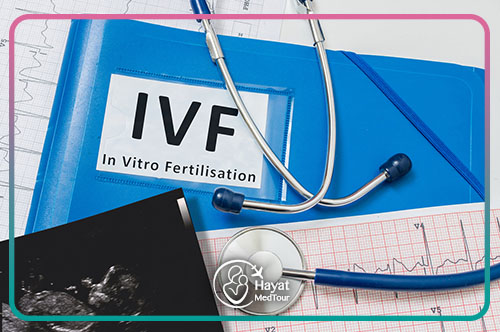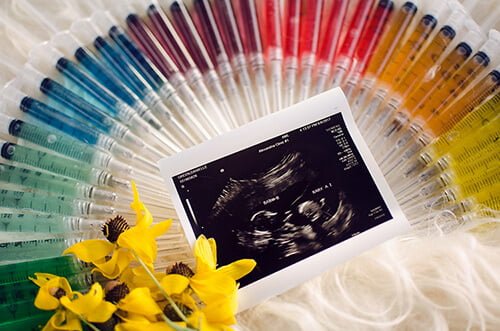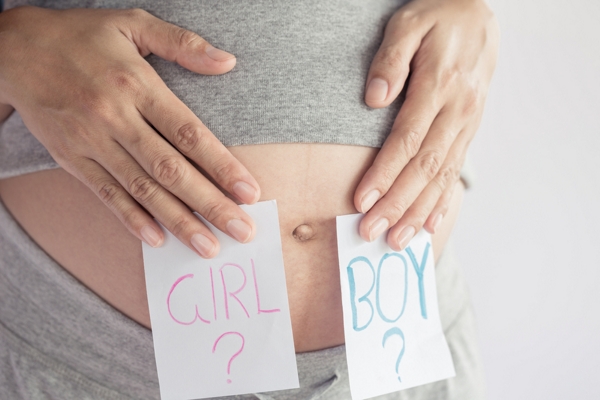Hayat MedTour is a medical tourism facilitator in Iran that has specialized in providing fertility assistance, infertility treatment and IVF in Iran at the best quality and affordable prices
Wednesday, April 27, 2022
HayatMedTour | Fertility Treatment in Iran | IVF in Iran
Friday, July 23, 2021
Tips for a Successful IVF and Pregnancy
Read an article on “tips for increasing fertility” and you’re bound to see something about the importance of lifestyle – typically diet and exercise. A wide range of studies shows a correlation between women with healthy weights and increased IVF success rates.
Exercise and IVF, however, is a trickier business. Too much exercise – particularly cardiovascular activity – seems to have an effect on reproductive hormone production, and that affects your ability to conceive.
Another challenge in determining “how much is too much” is that “exercise” for one woman is very different from exercise for another. The frequent low-impact walker exercises, as does the regular triathlete, as does the lifelong equestrian rider or rock climber. However, the intensity levels and risks associated with these various exercises are very different, and some are more conducive to a successful IVF cycle and a healthy pregnancy than others.
Take it Easy and Other Exercise Tips for IVF Success
After reviewing studies regarding exercise, pregnancy, and IVF success, we’ve found these 6 tips will help you achieve the healthy pregnancy and live birth you so anxiously desire.
- Take it easy. That’s the most important and more general advice we can give to women who are pursuing IVF. We realize that taking it easy is a major challenge for women who are used to vigorous exercise. However, the more studies you review, the more you will see a correlation between increased physical activity and decreased rates of conception. If you are a regular runner, biker, marathon runner, or participate in workout regimens designed for moderate/advanced athletes, your doctor is probably going to tell you to take it easy while pursuing your fertility treatments.
- Four hours or less. What does “take it easy mean?” Well, good question. A study, published in Obstetrics and Gynecology, reviewed IVF results for more than 2200 women over a nine-year period. Their conclusion was, “Women who reported exercising 4 hours or more per week for 1-9 years were 40% less likely to have a live birth and were almost three times more likely to experience cycle cancellation and twice as likely to have an implantation failure or pregnancy loss than women who did not report exercise.” These findings may inspire you to pare your routine down a bit during the months preceding, during, and after your IVF cycle to give you and your baby the best chance for success. Keep your cardio workouts to no more than 4 hours per week and fill in the gaps with lower-intensity options that still increase strength and flexibility, like yoga, water exercise, or tai chi.
- Ditch high-impact anything. If your exercise of choice is high-impact, it’s time to put it on the backburner for a while. Any serious falls, injuries or impact to the abdominal wall can seriously compromise your reproductive health, especially if there is a freshly implanted baby in there, or if you are prone to miscarriages.
- Prepare for “no exercise” during the week of egg retrieval. This isn’t because you shouldn’t (although you will want to take it easy), but more because you probably won’t feel like it. The fertility medications you’ll take, combined with some of their potential physical side effects – like bloating, fatigue, and mild discomfort – will make you feel more like lying down and taking a nap than going outside to run a few miles. This is A-OK, and we always recommend you listen to your body and not push anything. You are embarking on a very intricate and delicate process, so you don’t want to do anything that could compromise it.
- Start finding other modes of stress release. For many women, regular exercise is as much about the stress relief and endorphin rush as it is about weight loss or overall health. If this is the case for you, start learning new ways to reduce or eliminate stress. What are some of the things you’ve always wanted to try but haven’t? Yoga, meditation, more outdoor time, a hobby or craft class, all those books you’ve meant to read but haven’t had time to? Now is the time to start fostering a relationship with other modes of stress release and “escape” so you won’t be so shell-shocked when you have to back off from exercising.
- Take the long view. Perhaps one of the best pieces of advice for any situation in life is to “take the long view.” Your months, or even a couple years, of lower-impact exercise may seem like forever to you, but they’re really not. You are making a tremendous commitment – mind, body, soul, and wallet – to bring a baby into your life. The months you spend cutting back on excessive exercise now will be well worth the final results. Once you have your beautiful baby in your arms, you’ll enjoy nothing more than loading him or her up in your jogging stroller and getting back in shape. For now, just enjoy the miraculous process of transforming two single cells into a healthy, happy, miniature human being!
IVF and Exercise: 6 Tips for a Successful and Healthy Pregnancy
Saturday, June 26, 2021
Egg donation cost in Iran
Egg donation in Iran
Infertility treatment centers in Iran since the late 1990s, along with the world’s advanced centers, have used egg donation to treat infertile couples who suffer from the low ovarian reserve or poor quality eggs. In addition to Iranian infertility couples, foreign couples can also use the egg donation services of infertility treatment centers in Iran to solve the problem of infertility. Every year, infertile couples from different countries such as Iraq, Oman, Turkey, Kuwait, Afghanistan, Australia, Azerbaijan, Armenia, UAE, etc. go to Iranian fertility treatment centers to solve their infertility problem and use egg donation in Iran.
Egg donors are selected following certain principles and standards in Iran. Egg donation volunteers are consulted after various tests and physical health assurance; to ensure their mental health and readiness to donate. Donated eggs are examined in well-equipped Iranian laboratories, and quality eggs are selected for the next steps.
Egg donation cost in Iran
The cost of infertility treatment using donated eggs in Iran includes the cost of eggs and the cost of medicine, conventional tests, and the transfer of the fetus to the mother’s uterus. The cost of a donated egg service in Iran (IVF with donor eggs in Iran) is about 4,000 $. Egg donation service in reputable infertility treatment centers in Iran and high quality and world-class has an affordable price.
couples who want to select their baby sex can use PGD service for determining embryo gender. One of the PGD techniques uses is to determine the sex of the embryos before transferring to the uterus and pregnancy.
You can contact us to benefit from infertility treatment services using donated eggs in Iran & IVF with donor eggs in Iran.
We are with you to hug your beloved child.
Friday, November 6, 2020
The IVF success Factors
Considering IVF Then it’s important to learn about IVF success factors that can help or hinder you're getting pregnant.
In fact, the live birth IVF success rate for women under 35 who start an IVF cycle is 40 percent. However, women over the age of 42 have a 4 percent success rate.
IVF Success Factor 2 – Previous pregnancy
If you were pregnant previously with the same partner that’s currently undergoing IVF treatment, there is a greater probability of IVF success. Factors such as a history of recurrent miscarriage or a different partner may reduce the chances of IVF success.
Very important to know: IVF success factors are dependent on ovulation. Ovarian dysfunction, like high FSH levels which indicate a low ovarian reserve, may reduce the chances of IVF success. Factors that may lower pregnancy rates and reduce success with IVF include needing large amounts of ovulation stimulation drugs.
When both partners are infertile with lower chances for IVF success, factors such as the length of time you have been infertile are important to consider. The chances of IVF success decrease with the amount of time a couple has been infertile.
- Smokers require higher dosages of fertility drugs to stimulate their ovaries
- Smokers have lower implantation rates than nonsmokers
- Women who smoke require almost twice as many IVF attempts
- Women who smoke experience more failed fertilization cycles
More IVF success factors to mull over include losing weight if you are overweight or obese. Women who are overweight have an increased risk of infertility as well as miscarriage. Overweight women also have less IVF success with fertility treatments than women of normal weight. Underweight women are also at greater risk of having success with IVF. Bottom line: aim to stay within a healthy weight range.
- The training and experience of the IVF clinic and staff
- The live birth rate per IVF cycles started
- The rate of patients pregnant with multiples (twins, triplets, or more)
- The laboratory used by the clinic and the qualifications of their staff
- The types of patients accepted at the clinic, more specifically their age and fertility problem
Keep in mind that some clinics are more willing to accept patients with a lower chance of IVF success or they may specialize in particular treatments.
Tuesday, October 27, 2020
common indications for IVF treatment
Although its original intention was to treat women with tubal disease, in-vitro fertilization (IVF) can help couples overcome various types of infertility. For some diagnoses or conditions, such as tubal factor, IVF may be the first-line treatment. In other cases, IVF may be recommended only if simpler treatment fails. Below is a list of common indications for IVF treatment:
Tubal Factor (Damage to Fallopian Tubes) / Pelvic Adhesions
There are two options to treat patients with significant tubal damage and/or pelvic adhesive disease. The first option is to surgically repair the tubes and either get pregnant naturally or use Artificial Insemination or IUI to get pregnant. In many cases, however, surgery is not a good option as it may be very difficult to surgically fix the damaged tube(s) and/or the surgery may cause a high risk of an ectopic pregnancy. In these instances where the surgical option does not pose a high chance for success, the second option is to by-pass the tubes completely by using IVF as the treatment plan. Advanced Fertility Care Physicians will individualize the treatment plan for each patient or couple at our Mesa, Scottsdale, and Glendale AZ offices, and if you have tubal damage, they will provide you detailed information on each option so that you can make an informed decision.
Endometriosis
Current scientific data about endometriosis show that mild to moderate forms of endometriosis may be effectively treated with a combination of surgical and medical therapy. For more stages of endometriosis, including the presence of endometriomas, IVF is the optimal first-line treatment and offers the highest pregnancy success rates.
Male Factor Infertility
One of the most significant advances in the treatment of infertility has been the ability of men with severe sperm abnormalities to achieve fertilization of the egg and successful pregnancy. IVF with the addition of ICSI (Intracytoplasmic Sperm Injection) has enabled couples suffering from abnormal sperm, who would not otherwise be able to conceive, to be able to start a family. ICSI is often recommended if there is any suggestion of a sperm problem, if sperm are obtained surgically, or if there has been a prior failure of fertilization.
Diminished Ovarian Function & Age-Related Infertility
During the course of a woman’s normal reproductive life, her ovarian function decreases with age. In many cases, this reduced function can be overcome through the use of IVF alone, or in conjunction with techniques such as Assisted Hatching and ICSI. For some women, this decrease in ovarian function may start at earlier ages and requires aggressive treatment with IVF sooner rather than later.
Anovulation & Polycystic Ovarian Syndrome (PCOS)
The majority of patients with an ovulation and/or PCOS often conceive using less aggressive treatments such as ovulation induction with IUI. For some patients who are “high responders” to gonadotropin therapy, IVF offers an excellent prognosis and reduces some of the risks of higher-order multiples.
Unexplained Infertility
Approximately 20% of couples will have no identifiable cause of infertility after completing a comprehensive evaluation. IVF is often successful even if more conservative treatments have failed, especially since some of these couples may have yet unidentifiable causes of infertility or sub-fertility.
Family Balancing (also known as Gender or Sex Selection)
For families that wish to have additional children of a particular gender after already having a previous child, PGD allows for the selection of embryos to transfer based on gender. While not perfect, embryo biopsy with genetic chromosome determination prior to the transfer of embryos can allow families to choice in how they expand the family. Read more about PGD.
Genetic Diseases / Preimplantation Genetic Screening or Diagnosis (PGS or PGD)
One additional indication for IVF is to provide genetic testing on embryos prior to implantation. PGD or PGS is used for patients who are at risk for passing on genetic disorders to their offspring as a result of one or both of the partners being carriers for the disease. Diseases such as Cystic fibrosis and Thalassemia are 2 examples of the hundreds of diseases that can be tested for prior to embryo implantation. In addition, IVF with PGS is indicated for women with recurrent pregnancy loss related to chromosomal abnormalities or repeated failed IVF attempts. Learn more about PGD.
Monday, October 19, 2020
What is IVF?
In Vitro Fertilization (IVF) is a form of assisted reproductive technology (ART) that helps couples dealing with infertility conceive. The process involves extracting a woman’s eggs, collecting a sperm sample, and combining the egg and sperm manually. After the egg and sperm have been combined in the laboratory, the embryo or embryos are transferred to the uterus. Although more costly, time-consuming, and invasive than artificial insemination, IVF has excellent success rates for overcoming various types of infertility. Some of these include tubal factor, endometriosis, male factor infertility, age-related infertility, diminished ovarian function, polycystic ovarian syndrome, and unexplained infertility. Other implications for IVF are gender selection and preimplantation genetic screening for parents at risk of passing down genetic disorders.
There are additional options for IVF, like ICSI, PGD, assisted hatching, donor sperm, and a gestational carrier. Our goal is to help you have a healthy baby, the least invasive, most cost-effective way. The Advanced Fertility Clinic physicians will go over every possible option with you to guide you in making a more informed decision about the process that is right for you.
Thursday, October 8, 2020
increase chances of conceiving by IVF
If you are looking to increase your chances of conceiving during IVF, here are 8 tips from 5 different fertility doctors.
1. Maintain a healthy weight.
"Maintaining a healthy weight is extremely important infertility and IVF," says Linnea Goodman, MD, Assistant Professor of Obstetrics and Gynecology at the UNC School of Medicine. "We know that being obese (BMI >35) and underweight (BMI <19) increases the time of conception by 2 and 4 times respectively, and negatively affects IVF success rates. Being overweight also makes monitoring the ovaries during IVF more difficult and increases the chance of complications during egg retrievals."
This is best implemented with changes in diet and activity with professional help.
"Working with a dietitian, and in some programs enrolling in a cardiometabolic weight loss program can help achieve these goals," says Zaraq Khan, MD, a reproductive endocrinologist at Mayo Clinic in Rochester, MN.
2. Optimize sperm health.
"Use of multivitamins and maintaining optimal body weight, as well using boxers over briefs, could improve sperm quality," says Dr. Khan. "Under appropriate care, men can also be started on medications that can help boost sperm numbers and quality that can have a beneficial impact on IVF outcome. In certain cases, sperm aspirated directly from the testicle over ejaculate could also be beneficial. Involving a male infertility specialist for any form of abnormalities in semen analyses is key."
3. Partner with an excellent doctor and embryology laboratory.
"Choosing an excellent reproductive endocrinologist is twofold: in addition to experience and commitment to evidence-based medicine, look for someone with whom you feel comfortable and connected. Your doctor will accompany you on this very emotional journey and it is important for you to feel supported and heard," says Elizabeth Fino, MD, fertility specialist at NYU Langone Fertility Center. "Asking for recommendations from friends and family who know you best can help guide you to a knowledgeable physician with whom you feel comfortable, but also be sure to do your research."
In a world of online reviews, it can be difficult to determine credibility.
"Be careful of online reviews—they are often completed by select patients who had an extreme experience for one reason or another and may not be universally applicable.
To find an excellent embryology laboratory, look for a long history of exceptional outcomes. One source is the Society for Assisted Reproductive Technology which details the clinic's volume and live birth rate."
4. Reduce your stress.
"Basal stress levels can influence natural and assisted conception rates," says Dr. Khan. "Reducing stress troubles during an IVF stimulation cycle can be one of the hardest things to achieve for couples. Several reports suggest improvement of pregnancy outcomes with the use of acupuncture and other stress-relieving techniques, like enrolling in mind-body programs, stress reduction, and resilience training workshops."
5. Quit smoking
"Smoking can drastically decrease the chance of success while doing IVF because it affects egg and sperm quality," says Dr. Khan.
But you don't have to do it on your own.
"Quitting smoking is not an easy task and often requires a great deal of personal as well as professional support. Try to involve your friends and family to help encourage you in the process. For smoking cessation, structured programs and/or pharmacological assistance have proven to be most successful," says Dr. Fino.
6. Look into taking supplements
"DHEA and CoQ10 are supplements that have shown some promise in association with an increase in egg quantity and quality," says Dr. Fino. "Talk to your doctor to see if he or she recommends them for you."
Multivitamins may also be helpful, adds Dr. Khan.
7. Ensure you have adequate levels of vitamin D
"Over 40% of individuals are deficient in Vitamin D, and there is emerging data on its association with infertility and worse IVF outcomes," says Tarun Jain, MD, medical director of Northwestern Medicine Fertility and Reproductive Medicine Oakbrook Terrace. "Ask your doctor to check your vitamin D level, and consider taking a vitamin D supplement."
8. Focus on persistence and patience.
"Many patients require more than one cycle of IVF to achieve an embryo for transfer and outcomes may vary significantly from cycle to cycle," says Shannon DeVore, MD, at NYU Langone Fertility Center. "If your first cycle wasn't successful, your doctor may be able to adjust the medications to optimize a subsequent one. Other times, it just means keeping at it. Try not to be discouraged by sub-optimal outcomes and setbacks—you are doing everything right. The single biggest thing to remember is that most (or all) of this is out of your control. Nobody likes a lack of control, but sometimes letting go can help you endure the journey. Take care of yourself and don't blame yourself when things don't go well. You are not alone, it often takes a village to build a family."
Tuesday, September 22, 2020
risks of IVF
IVF treatment doesn't always result in pregnancy, and it can be both physically and emotionally demanding. You should be offered counseling to help you through the process.
There are also a number of health risks involved, including:
- side effects from the medications used during treatment, such as hot flushes and headaches
- multiple births (such as twins or triplets) – this can be dangerous for both the mother and the children
- an ectopic pregnancy – where the embryo implants in the fallopian tubes, rather than in the womb
- ovarian hyperstimulation syndrome (OHSS) – where too many eggs develop in the ovaries
Read more about risks of IVF.
Sunday, September 13, 2020
IVF step by step
IVF treatment involves 6 main stages:
- suppressing your natural cycle – the menstrual cycle is suppressed with medication
- boosting your egg supply – medication is used to encourage the ovaries to produce more eggs than usual
- monitoring your progress and maturing your eggs – an ultrasound scan is carried out to check the development of the eggs, and medication is used to help them mature
- collecting the eggs – a needle is inserted into the ovaries, via the vagina, to remove the eggs
- fertilizing the eggs – the eggs are mixed with the sperm for a few days to allow them to be fertilized
- transferring the embryo(s) – 1 or 2 fertilized eggs (embryos) are placed into the womb
Once the embryo(s) has been transferred into your womb, you'll need to wait 2 weeks before taking a pregnancy test to see if the treatment has worked.
Saturday, September 5, 2020
IVF Costs in Iran
The average cost of an IVF cycle in the U.S. is $12,400, according to the American Society of Reproductive Medicine. This price will vary depending on where you live, the number of medications you're required to take, the number of IVF cycles you undergo, and the amount your insurance company will pay toward the procedure. You should thoroughly investigate your insurance company's coverage of IVF and ask for a written statement of your benefits. Although some states have enacted laws requiring insurance companies to cover at least some of the costs of infertility treatment, many states haven't.Costs-of-IVF

The cost of IVF in Iran is more affordable than in other countries. Also, in Iran, the infertility treatment services such as IVF have a high quality in the region and in the world. The low-cost of IVF in Iran is due to the low doctors’ wages and inexpensive services in the clinic. The medications cost are the same all over the world. Learn more about IVF cost in Iran: The cost of IVF in Iran
Tuesday, September 1, 2020
Issues With IVF
Any embryos that you do not use in your first IVF attempt can be frozen for later use. This will save you money if you undergo IVF a second or third time. If you do not want your leftover embryos, you may donate them to another infertile couple, or you and your partner can ask the clinic to destroy the embryos. Both you and your partner must agree before the clinic will destroy or donate your embryos.

A woman's age is a major factor in the success of IVF for any couple. For instance, a woman who is under age 35 and undergoes IVF has a 39.6% chance of having a baby, while a woman over age 40 has an 11.5% chance. However, the CDC recently found that the success rate is increasing in every age group as the techniques are refined and doctors become more experienced.
Tuesday, August 25, 2020
IVF success rate
IVF success rate depends on a number of factors, including the reason for infertility, where you're having the procedure done, and your age.

The CDC compiles national statistics for all assisted reproductive technology (ART) procedures performed in the U.S., including IVF, GIFT, and ZIFT, although IVF is by far the most common; it accounts for 99% of the procedures. The most recent report from 2016 found:
- Pregnancy was achieved in an average of 27.3% of all cycles (higher or lower depending on the age of the woman).
- The percentage of cycles that resulted in live births was 22.2% on average (higher or lower depending on the age of the woman).
Saturday, August 15, 2020
What Can I Expect From IVF?
The first step in IVF involves injecting hormones so you produce multiple eggs each month instead of only one. You will then be tested to determine whether you're ready for egg retrieval.

Prior to the retrieval procedure, you will be given injections of a medication that ripens the developing eggs and starts the process of ovulation. Timing is important; the eggs must be retrieved just before they emerge from the follicles in the ovaries. If the eggs are taken out too early or too late, they won't develop normally. Your doctor may do blood tests or an ultrasound to be sure the eggs are at the right stage of development before retrieving them. The IVF facility will provide you with special instructions to follow the night before and the day of the procedure. Most women are given pain medication and the choice of being mildly sedated or going under full anesthesia.
During the procedure, your doctor will locate follicles in the ovary with ultrasound and remove the eggs with a hollow needle. The procedure usually takes less than 30 minutes, but may take up to an hour.
Immediately following the retrieval, your eggs will be mixed in the laboratory with your partner's sperm, which he will have donated on the same day.
While you and your partner go home, the fertilized eggs are kept in the clinic under observation to ensure optimal growth. Depending on the clinic, you may even wait up to five days until the embryo reaches a more advanced blastocyst stage.
Once the embryos are ready, you will return to the IVF facility so doctors can transfer one or more into your uterus. This procedure is quicker and easier than the retrieval of the egg. The doctor will insert a flexible tube called a catheter through your vagina and cervix and into your uterus, where the embryos will be deposited. To increase the chances of pregnancy, most IVF experts recommend transferring up to three embryos at a time. However, this means you could have multiple pregnancies, which can increase health. risks for both you and the babies
Following the procedure, you would typically stay in bed for several hours and be discharged four to six hours later. Your doctor will probably perform a pregnancy test on you about two weeks after the embryo transfer.
In cases where the man's sperm count is extremely low or there is poor motility (movement of the sperm), doctors may combine IVF with a procedure called intracytoplasmic sperm injection. In this procedure, sperm is taken from semen -- or in some cases right from the testicles -- and inserted directly into the egg. Once a viable embryo is produced, it is transferred to the uterus using the usual IVF procedure.
Saturday, August 8, 2020
Causes of Infertility Can Treated by IVF
When it comes to infertility, IVF can be an option if you or your partner have been diagnosed with:
- Endometriosis
- Low sperm counts
- Problems with the uterus or fallopian tubes
- Problems with ovulation
- Antibody problems that harm sperm or eggs
- The inability of sperm to penetrate or survive in the cervical mucus
- Poor egg quality
- The genetic disease of mother or father
- An unexplained fertility problem
IVF method is never the first step in the treatment of infertility except in cases of complete tubal blockage. Instead, it's reserved for cases in which other methods such as fertility drugs, surgery, and artificial insemination haven't worked.










